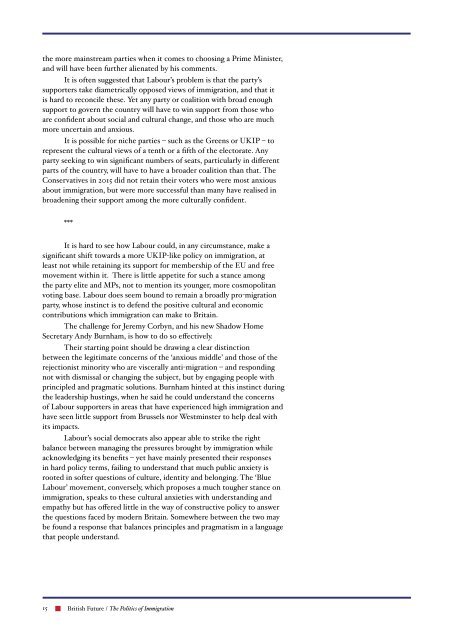THE POLITICS OF IMMIGRATION
The-politics-of-immigration
The-politics-of-immigration
Create successful ePaper yourself
Turn your PDF publications into a flip-book with our unique Google optimized e-Paper software.
the more mainstream parties when it comes to choosing a Prime Minister,<br />
and will have been further alienated by his comments.<br />
It is often suggested that Labour’s problem is that the party’s<br />
supporters take diametrically opposed views of immigration, and that it<br />
is hard to reconcile these. Yet any party or coalition with broad enough<br />
support to govern the country will have to win support from those who<br />
are confident about social and cultural change, and those who are much<br />
more uncertain and anxious.<br />
It is possible for niche parties – such as the Greens or UKIP – to<br />
represent the cultural views of a tenth or a fifth of the electorate. Any<br />
party seeking to win significant numbers of seats, particularly in different<br />
parts of the country, will have to have a broader coalition than that. The<br />
Conservatives in 2015 did not retain their voters who were most anxious<br />
about immigration, but were more successful than many have realised in<br />
broadening their support among the more culturally confident.<br />
***<br />
It is hard to see how Labour could, in any circumstance, make a<br />
significant shift towards a more UKIP-like policy on immigration, at<br />
least not while retaining its support for membership of the EU and free<br />
movement within it. There is little appetite for such a stance among<br />
the party elite and MPs, not to mention its younger, more cosmopolitan<br />
voting base. Labour does seem bound to remain a broadly pro-migration<br />
party, whose instinct is to defend the positive cultural and economic<br />
contributions which immigration can make to Britain.<br />
The challenge for Jeremy Corbyn, and his new Shadow Home<br />
Secretary Andy Burnham, is how to do so effectively.<br />
Their starting point should be drawing a clear distinction<br />
between the legitimate concerns of the ‘anxious middle’ and those of the<br />
rejectionist minority who are viscerally anti-migration – and responding<br />
not with dismissal or changing the subject, but by engaging people with<br />
principled and pragmatic solutions. Burnham hinted at this instinct during<br />
the leadership hustings, when he said he could understand the concerns<br />
of Labour supporters in areas that have experienced high immigration and<br />
have seen little support from Brussels nor Westminster to help deal with<br />
its impacts.<br />
Labour’s social democrats also appear able to strike the right<br />
balance between managing the pressures brought by immigration while<br />
acknowledging its benefits – yet have mainly presented their responses<br />
in hard policy terms, failing to understand that much public anxiety is<br />
rooted in softer questions of culture, identity and belonging. The ‘Blue<br />
Labour’ movement, conversely, which proposes a much tougher stance on<br />
immigration, speaks to these cultural anxieties with understanding and<br />
empathy but has offered little in the way of constructive policy to answer<br />
the questions faced by modern Britain. Somewhere between the two may<br />
be found a response that balances principles and pragmatism in a language<br />
that people understand.<br />
15 British Future / The Politics of Immigration


